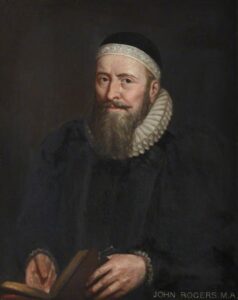What is the meaning of Psalm 23? What is its spiritual message? For many centuries it was understood that in this psalm David was not only praising God as his strong and faithful shepherd, but was also praising God’s word as the chief benefit we receive from him. In an essay that he translated from Martin Luther, Myles Coverdale wrote in 1537,
Myles Coverdale
In this psalm David, with every Christian heart, gives thanks and praise to God for his most principal benefit; namely, for the preaching of his dear and holy word…. This same noble treasure does holy David praise and extol marvelous excellently, with goodly, sweet, fair, and pure words … [he] calls it goodly pleasant green grass, fresh water, the right way, a staff, a sheep-hook, a table, balm, or pleasant oil, and a cup that is always full.
However, this emphasis on God’s word has been completely lost since John Calvin’s new commentary (discussed below), and since the Geneva Bible, following Calvin, made certain key changes to the original English translations of the psalm. Modern Bibles have followed the Geneva revisions and commentaries, and this has led to a widespread re-interpretation of Psalm 23.
The first two verses, which set the stage for interpreting the meaning of Psalm 23, were translated differently in the three English Reformation Bibles – the Coverdale, Matthew, and Great Bibles – than in the 1560 Geneva Bible and later versions. Especially, they gave different imagery. In the Matthew Bible these verses, with John Rogers’ note on verse 2, read as follows:
Psalm 23:1-2, MB The Lord is my shepherd; I can want nothing. He feedeth me in a green pasture, and leadeth me to a *fresh water.
MB note: *This fresh water is the healthful water of the word of God.

John Rogers
John Rogers took the Matthew Bible translation of Psalm 23 from Myles Coverdale’s 1535 Bible, and he added several notes explaining how the shepherdly imagery signifies the benefits of the word of God, which, by its promises, instruction, and teaching, feeds and sustains God’s sheep with spiritual food and drink. The word is the grass and water of their pasture, and is their strength and comfort as they walk in the valley of the shadow of death that is this present life. Indeed, it is their very life.
Until more recent times, this was the traditional understanding of the meaning of Psalm 23. Cyril of Alexandria wrote in the 5th century that “the place of verdure (green pasture) means the ever-fresh words of Holy Scripture, which nourishes the hearts of believers and gives them spiritual strength.” Augustine and Martin Luther also held that Psalm 23 teaches about the place and work of God’s word in the life of a believer: it quickens us to life and brings us forth into the way of righteousness (v3); it is the table set before us in the presence of our enemies (v5); etc.
In 1537 Coverdale published, A Sweet Exposition on Psalm 23,[1] the essay that he translated from Martin Luther. The quotation in my first paragraph above is from this work. I have been studying it to prepare for publishing as part of the Coverdale series of books, and I have found it very strengthening for my faith – which, of course, was precisely Coverdale’s hope for it. I therefore want to share some excerpts here, so others may also be strengthened, especially in these troubling times. Below are a few passages from the Sweet Exposition containing Coverdale’s (and Luther’s) teachings on Psalm 23. I have lightly updated the English just for this blog post.
Myles Coverdale (with Martin Luther) on the meaning of Psalm 23
The fruits of God’s word for those who believe
As for the people of God, or the holy congregation of Christ, the prophet calls it a green meadow. For it is a pleasant garden, adorned and beautified with all manner of spiritual gifts. The pasture or grass therein is the word of God, whereby consciences are strengthened and refreshed…. This is now the first fruit of the word of God: that the Christians are so instructed thereby that they increase in faith and hope, and learn to commit all their doings to God. And whatever they have need of, either in soul or body, they look for it at his hand.…
This is the second fruit of God’s word: It is to his faithful people not only pasture and grass, by which they are filled and strengthened in faith, but it is also to them a goodly, cold, fresh water, where they take refreshing, comfort, and encouragement….
With these words “You anoint my head with oil and fill my cup full,” the prophet wishes to describe the great, rich comfort that those who are faithful have by the word of God, so that their consciences are quiet, glad, and at rest in the midst of all temptations and troubles – yea even in death.
Our true riches are the word of God
This lesson should we learn; namely, to let the world boast of their great riches, honor, power, etc. For these are insecure, uncertain, and transitory wares, which God casts into the dungeon. It is a small matter for him to give an ungracious person, who blasphemes and dishonors him, for his reward, a kingdom, a dukedom, or any other benefit and good upon the earth. These worldly goods are his draff and swillings, with which he fills the hogs’ bellies, whom he is disposed to kill. But to his children, as David says here, he gives the right treasure. Therefore we should not, as the dear children and heirs of God, boast about our wisdom, strength, or riches, but of this: that we have the precious pearl, even that worthy word, by which we know God our loving Father and Jesus Christ whom he has sent.
This is our treasure and inheritance, which is sure and everlasting, and better than all the goods of the world. Whoever has this, let him suffer others to gather money together, to live luxuriously, to be proud and high minded; but though he himself be despised and poor in the sight of the world, yet let that not tempt him. Rather, let him thank God for his inexpressible gift, and pray that he may abide by it. It makes no matter how rich and glorious we are here on earth; if we keep this treasure, we have plenty of riches and honor…
May the God of mercy grant us grace so that we also, after the example of David, Paul, and other holy men, may count our treasure, which is even the same that they had, as great, and may magnify it above all the goods upon earth, and heartily give God thanks for it, that he has deigned to give it to us above many thousands of others.
Why we should cleave to the word
If you continue to cleave fast to the word, then you will suffer neither the deceitfulness of the devil, the displeasure and madness of the world, nor your own infirmity and unworthiness to overcome you through trials, but will go on boldly and say, “Whether the devil, the world, or my own conscience take part against me ever so fiercely, yet I will not give it overmuch thought. It must and shall be thus, and whoever is a sheep of the Lord cannot remain untried. Let it go with me as it may – yea, whether they seethe me or roast me, yet this is my comfort: that my shepherd has given his life for me. Besides this, he has also a sweet and loving voice, with which he comforts me and says I shall never perish, nor shall anyone pluck me out of his hand, but I will have everlasting life.
“This promise will be faithfully kept with me, whatever becomes of me. And though sometimes a sin or other impediment will chance by reason of my infirmity, yet he will not therefore cast me away; for he is a loving shepherd who looks to the weak sheep, binds up their wounds, and heals them. And to the intent that I should be the surer of this and not doubt, he has left me here the holy sacrament, for a sign that it is so indeed.”
Even so did the prophet do. He was not always happy, neither could he at all hours sing, “The Lord is my shepherd, I shall lack nothing.” He was sometimes in great straits, yea all too many, so that he could not feel the righteousness, comfort, nor help of God, but just sin, the wrath of God, fearfulness, despair, the pains of hell, etc., as he himself complained in many psalms. Nevertheless, he turned from his own feelings and took hold of God by his promise concerning the Messiah, who was then yet to come, and said in his mind, “However it stands with me, yet this is the comfort of my heart: I have a gracious and merciful Lord, who is my shepherd and whose word and promise strengthen and comfort me. Therefore, I shall lack nothing.”
These teachings are wonderfully strengthening and encouraging for the faith. However, they have been completely lost today.
The Geneva Bible changes and John Calvin’s teaching

John Calvin
The loss of the traditional doctrine can be traced back to the Geneva Bible and John Calvin. The Geneva Bible changed the imagery of verse 2 from feeding in a pasture and being led to a fresh water, to resting in a pasture by still waters. In addition, it removed all teaching about the word. The notes said nothing about God’s word – not at verse 2 or anywhere.
If readers want to compare the Matthew and Geneva Bibles, the full translations of Psalm 23 with all the notes are set out my paper posted here. The issues are also briefly discussed in chapter 16 of Part 2 of The Story of the Matthew Bible.
There can be little doubt that John Calvin’s teaching was the source of the new translation and interpretation in the Geneva version. In his commentary on the meaning of Psalm 23, Calvin said David was praising God for his “liberal” supply of temporal benefits, including “splendid riches,” “princely pleasures,” and “royal wealth,” but he never said anything about God’s word as a benefit or blessing. In fact, Calvin taught that David used not the word, but his worldly benefits and riches as “ladders” to ascend to God; David used his riches, said Calvin, to attain to God by “calling them to remembrance” and by “exciting himself to gratitude” for them. This new doctrine is summed up in his own words in both the introductory and concluding paragraphs of his commentary on Psalm 23:
Calvin on verse1: [W]e ought the more carefully to mark the example which is here set before us by David, who, elevated to the dignity of sovereign power, surrounded with the splendor of riches and honors, possessed of the greatest abundance of temporal good things, and in the midst of princely pleasures, not only testifies that he is mindful of God, but calling to remembrance the benefits which God had conferred upon him, makes them ladders by which he may ascend nearer to Him. By this means he not only bridles the wantonness of his flesh, but also excites himself with the greater earnestness to gratitude, and the other exercises of godliness …
On verse 6: It is, therefore, certain that the mind of David, by the aid of the temporal prosperity which he enjoyed, was elevated to the hope of the everlasting inheritance.[2]
Thus Calvin saw in temporal riches a way to ascend “nearer” to God, and even to the eternal hope. However, nowhere in his entire commentary did he mention or acknowledge that God calls us unto him by his word. In effect, he suggested that it is through our riches that we enter into the kingdom of heaven – in complete contradiction, of course, to Jesus, who said it is very hard for a rich man to enter into heaven (M’t. 19:24). Needless to say, riches are false ladders to God. Calvin also taught a false remembrance. He did not mention the remembrance of faith that Christ ordained: “This is my body broken for you; do this in the remembrance of me,” but taught the crass remembrance of worldly benefits.
Further, contrast Calvin’s teaching about ascending to God by the ladders of worldly benefits with what the apostle Paul said about God’s immediate presence with us by his word:
Romans 10:6-8 The righteousness that comes by faith speaks this way: Say not in your heart, who shall ascend into heaven? (which is nothing else than to fetch Christ down), or, who shall descend into the deep? (which is nothing else than to fetch Christ up from death). But what does the scripture say? The word is near you, even in your mouth and in your heart. This word is the word of faith that we preach.
Calvin did not preach the word of faith with us now, but worldly riches and benefits to ascend to a distant God. Consistent with this, he also wrote in the very first sentence of his commentary on Psalm 23, “God, by his benefits, gently allures us to himself.” Again, he did not say that by the word God calls us to him. Neither did he mention that the devil allures us with worldly riches. He warned against “insolence,” or being “elated above measure” with riches, but said a certain “relish” for them was lawful. He never cautioned against covetousness, nor did he advise the rich of their duty to share with the poor and needy.
According to Calvin, the meaning of Psalm 23 is that we should be grateful for worldly things, and especially for an abundance of them. He even taught that our wealth should be the measure of our gratitude. On verse 5 he wrote, “[L]et each of us stir up himself to gratitude to God for his benefits, and the more abundantly these have been bestowed upon us, our gratitude ought to be the greater.” I do not know if Calvin intended to suggest that rich people have higher ladders to God than poor people do; however, I am confident that all who have God’s word as their treasure, whether rich or poor, are equally close to him, equally grateful, and equally rich. As Coverdale said above, we all have the same treasure, and may all alike magnify it.
Calvin defeated the traditional understanding of Psalm 23. However, with the republication of Coverdale’s Sweet Exposition, hopefully people will learn to appreciate it again as it was appreciated and understood before Calvin, so we may all join with David in praise of God’s word, and may say with Cyril, Augustine, Coverdale, Luther, Rogers, and countless others down the ages:
In this psalm David, with every Christian heart, gives thanks and praise to God for his most principal benefit; namely, for the preaching of his dear and holy word.
*******************
Ruth Magnusson Davis, July 2021.
POSTSCRIPT April, 2022. We have now published Coverdale’s translation of Luther’s work on Psalm 23. It is available here on Amazon.com.
KPs What is the meaning of Psalm 23? The message of Psalm 23.
[1] Coverdale’s essay expounding the meaning of Psalm 23 actually referred to it as “Psalm 22.” This was the old numbering system employed in the Septuagint and the Latin Vulgate Bible. I have used the modern numbering for modern readers. The original title of Coverdale’s essay was A very excellent and swete exposition upon the two and twentye Psalme of David. It can be found in the Parker Society Volume, Remains of Myles Coverdale (or Myles Coverdale), linked here. The history of the numbering of the psalms will be reviewed in the Appendix to A Sweet Exposition of Psalm 23.
[2] I do not wish to link to Calvin’s commentary. This quotation and others in this post are from the biblehub platform. People may search and find Calvin’s full commentary there or on any internet Bible commentary platform. A more in-depth discussion of Calvin’s commentary on the meaning of Psalm 23 will be contained in the Appendix to the Baruch House publication of Coverdale’s Sweet Exposition on Psalm 23.

